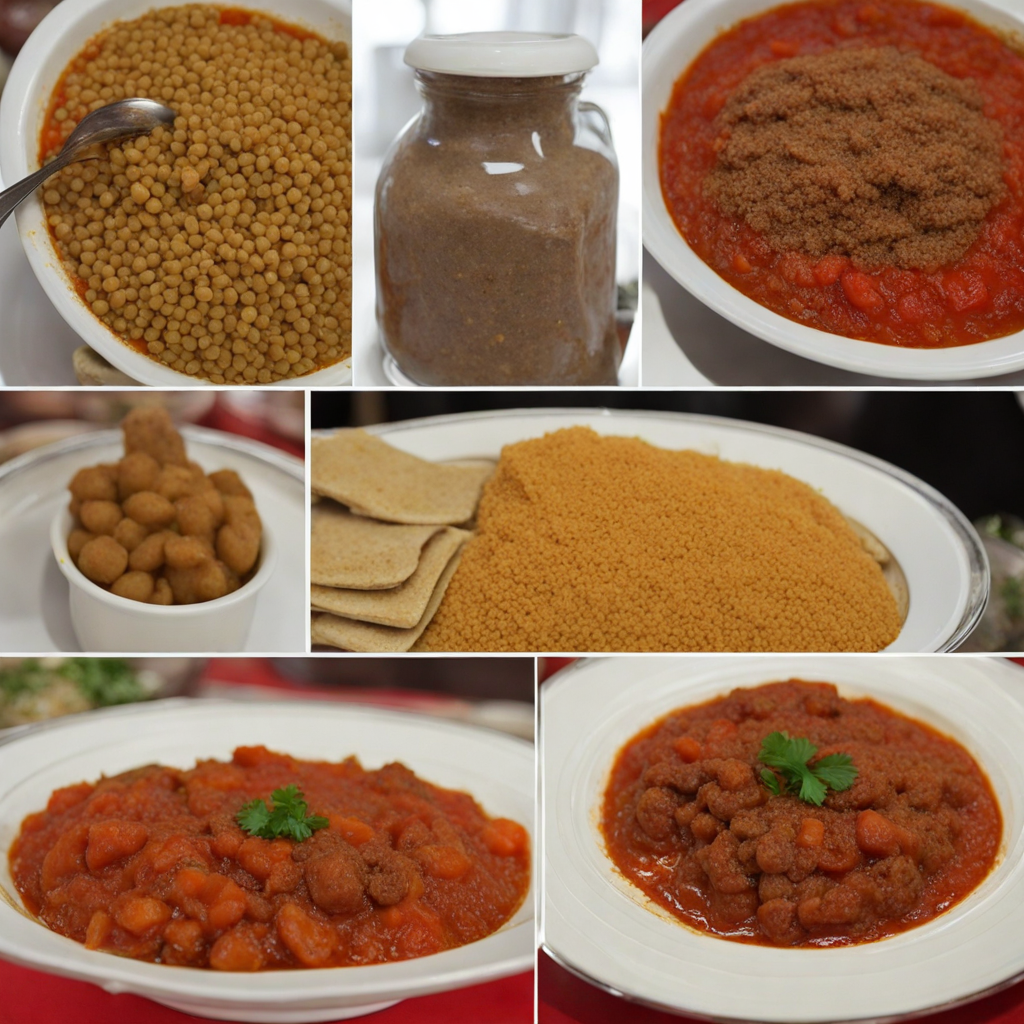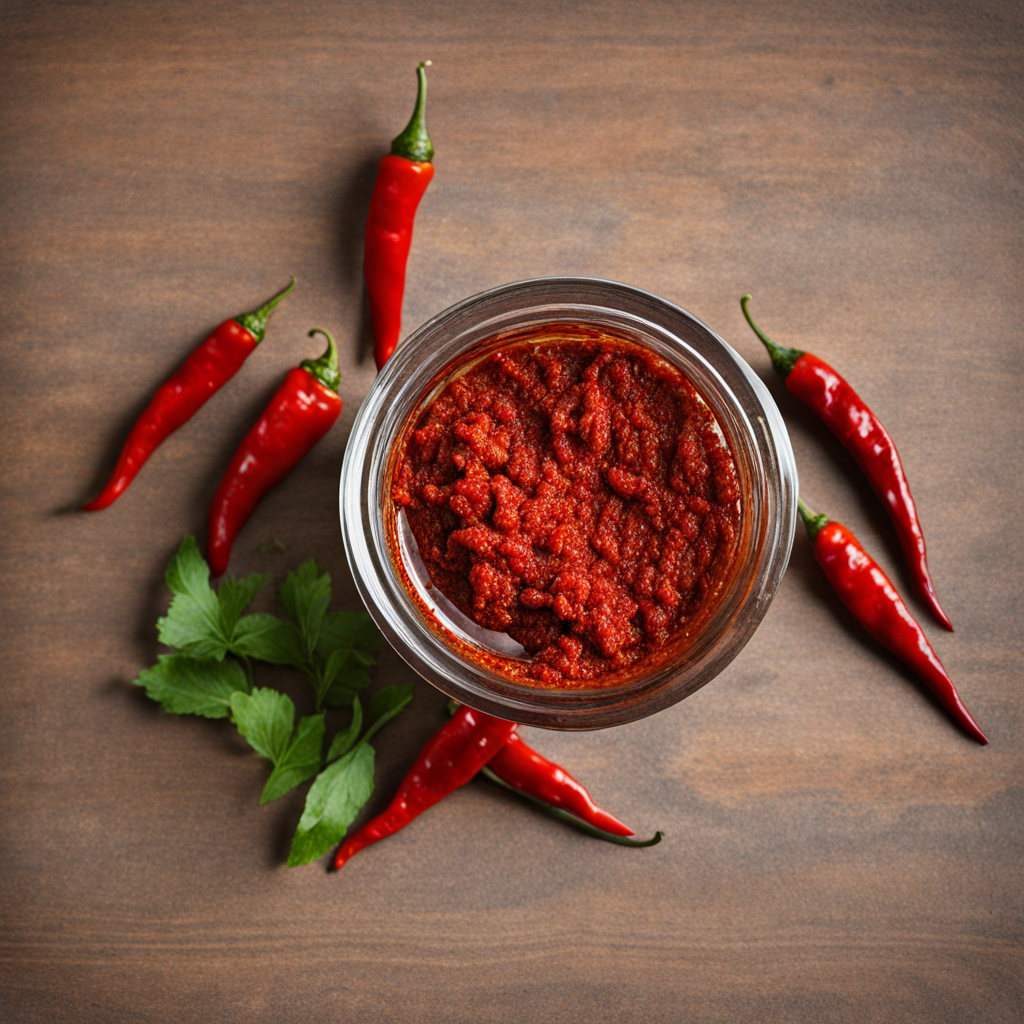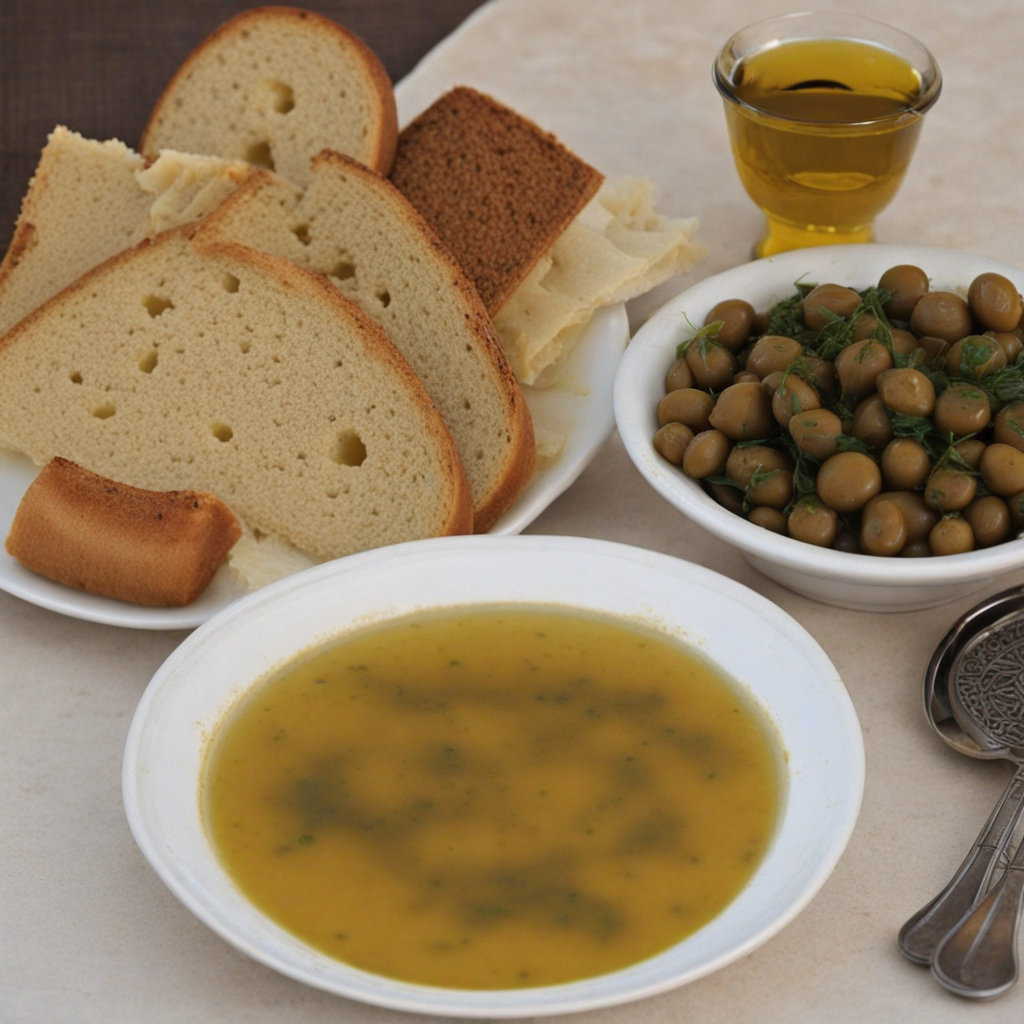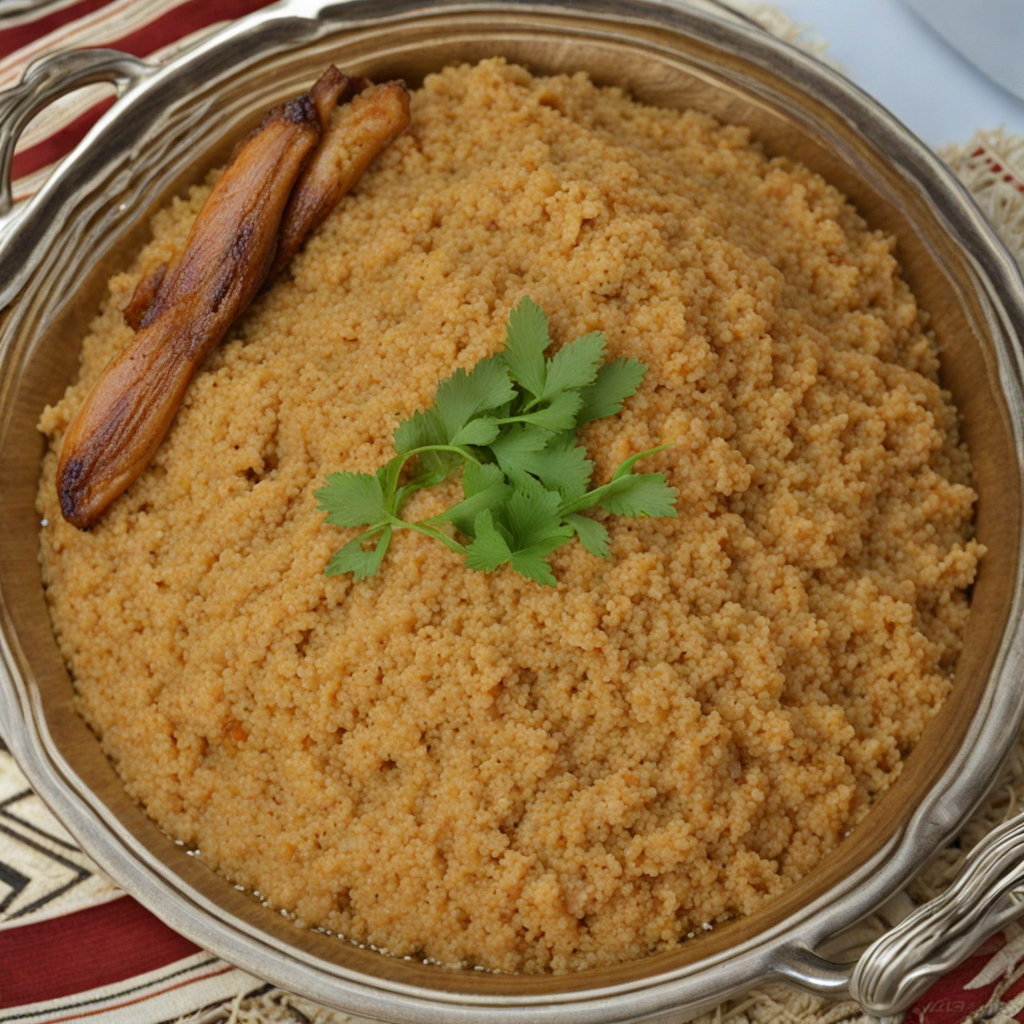Bazeen
Bazeen is a traditional Libyan dish that embodies the rich culinary heritage of the country. It is primarily made from barley flour, which is mixed with water to create a dough-like consistency. This dough is then shaped into a thick, round loaf and typically steamed, giving it a dense, chewy texture. The simplicity of its ingredients allows the natural flavor of the barley to shine through, making it a wholesome and hearty staple. Bazeen is often served as the base for various stews or sauces, which enhances its flavor and provides a satisfying meal experience. One of the most delightful aspects of Bazeen is how it is traditionally served. It is often placed in the center of a communal dish, surrounded by a rich meat or vegetable stew, such as a flavorful lamb or chicken tagine. Diners tear off pieces of the Bazeen to scoop up the stew, creating a hands-on dining experience that encourages sharing and connection. The dish can be seasoned with a variety of spices, such as cumin, coriander, and paprika, which infuse the Bazeen and its accompanying stew with aromatic flavors that tantalize the taste buds. The cultural significance of Bazeen goes beyond just its taste; it represents the warmth of Libyan hospitality. Often enjoyed during family gatherings and special occasions, it is a dish that brings people together. The act of sharing Bazeen is a gesture of community and togetherness, as families and friends gather around the table to enjoy this comforting and nourishing meal. For anyone looking to explore new flavors, Bazeen offers a unique taste of Libya that is both satisfying and steeped in tradition.
How It Became This Dish
The Culinary Journey of Bazin: A Libyan Heritage Dish Origins and Historical Background Bazin, a traditional Libyan dish, is a remarkable testament to the rich culinary heritage of North Africa. The dish's origins can be traced back to the Berber communities that have inhabited the region for centuries. The Berbers, known for their agrarian lifestyle, cultivated grains like barley and wheat, which formed the basis of their diet. Bazin, primarily made from barley flour, reflects the resourcefulness of these early communities in utilizing locally available ingredients. The name "bazin" is believed to derive from the Arabic word "basin," referring to the large, shallow dish or plate on which the dish is traditionally served. This etymology underscores the communal aspect of the meal, as Bazin is often enjoyed family-style, bringing people together around a shared dining experience. Cultural Significance In Libyan culture, Bazin holds a place of honor at the table, often served during significant gatherings, such as weddings, religious festivities, and family reunions. Its preparation and presentation are steeped in tradition and often involve the participation of women, who pass down the recipe and techniques through generations. The dish is more than just sustenance; it embodies social cohesion, heritage, and the values of hospitality and sharing that are integral to Libyan society. Bazin is typically served with a variety of accompaniments, such as stews, meat, and vegetables, allowing for a diverse range of flavors and textures. The most common pairing is with a rich, spicy tomato-based sauce, often featuring lamb or chicken and a medley of vegetables. This combination not only enhances the flavor but also showcases the culinary diversity of Libya, influenced by Mediterranean, Middle Eastern, and African flavors. Development Over Time As Libya has navigated through various historical changes, including colonization and political upheaval, the preparation and consumption of Bazin have evolved, yet the dish has retained its core identity. During the Italian colonization in the early 20th century, new ingredients and cooking techniques were introduced, subtly influencing traditional recipes. While pasta and pizza became popular, Bazin remained a steadfast symbol of national identity and resistance against foreign influence. In more recent times, globalization has impacted culinary practices worldwide, and Libya is no exception. The advent of social media and travel has allowed for the sharing of recipes and culinary traditions across borders. Libyan expatriates have taken Bazin with them, introducing the dish to new audiences while keeping its essence alive. Restaurants and food festivals celebrating Libyan cuisine have begun to emerge, showcasing Bazin as a must-try dish for those seeking authentic North African flavors. The Craft of Making Bazin The process of making Bazin is an art form that requires skill, patience, and a deep understanding of the ingredients. The primary ingredient, barley flour, is mixed with water and kneaded until a dough is formed. Unlike wheat-based doughs, Bazin's texture is coarser and denser, giving it a distinctive chewiness. The dough is then shaped into a round loaf and steamed, which is a vital step that differentiates Bazin from other bread-like dishes. Steaming is essential not only for achieving the right texture but also for preserving the nutrients in the barley. This step reflects a traditional cooking method that emphasizes health and sustainability, core values of Libyan cuisine. Once cooked, the loaf is allowed to rest before being served. It is typically broken apart by hand, a practice that symbolizes unity and sharing. Modern Adaptations and Global Influence In contemporary Libya, while traditional recipes remain revered, innovations have emerged, leading to new interpretations of Bazin. Chefs and home cooks alike are experimenting with different types of flour, such as whole wheat or even gluten-free alternatives. Some have incorporated spices and herbs that reflect the current culinary trends of fusion cuisine, blending Libyan flavors with international influences. Additionally, the rise of food tourism has brought Bazin to the forefront of culinary exploration in Libya. Travelers seeking authentic experiences are often guided to local homes or markets where they can witness the preparation of Bazin firsthand. This not only helps preserve the tradition but also creates economic opportunities for local communities, allowing them to share their heritage while benefiting from the growing interest in Libyan cuisine. Bazin's Role in Contemporary Libyan Society As Libya continues to evolve politically and socially, Bazin remains a comforting symbol of home and heritage. In times of uncertainty, the act of preparing and sharing food, particularly a dish as significant as Bazin, fosters a sense of belonging and continuity. It serves as a reminder of the resilience and strength of Libyan culture, which has withstood the test of time and change. Moreover, Bazin has found its place in the hearts of younger generations who are increasingly interested in their culinary roots. Cooking classes and workshops focusing on traditional Libyan dishes are becoming popular, fostering a renewed appreciation for the country's gastronomic heritage. This revival not only honors the past but also ensures that the future generations remain connected to their culinary identity. Conclusion Bazin is more than a mere dish; it is a narrative woven into the fabric of Libyan culture, encapsulating history, tradition, and community. Its evolution over time reflects the resilience of a people who have embraced change while holding steadfast to their roots. As Libya continues to navigate its path in the modern world, Bazin will undoubtedly remain a cherished symbol of its culinary heritage, inviting all who partake in it to experience a taste of history, culture, and togetherness.
You may like
Discover local flavors from Libya







